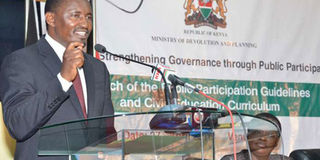Civic education vital for youth awareness

Devolution Cabinet Secretary Mwangi Kiunjuri delivers his keynote address during the launch of a civic education curriculum at KICC on April 27, 2016. Civic education is important. PHOTO | KNA
What you need to know:
- Civil society has an important role to educate the public on democratic values and behaviour.
- Truth be told, Kenyans can never build a strong democracy and a great country if they are not well informed.
As the 30-day mass voter registration planned to start on January 15 gets under way, civic education should be a priority in addressing high voter apathy among Kenyan youth.
To prepare youth to be responsible citizens and participate in elections and governance is important.
However, due to lack of information, many young people are left out.
The low turnout of Kenyans coming up to register to participate in elections provides the obvious justification for robust civic education and should motivate all players to engage the electorate, and especially the youth, to register.
The target of the Independent Electoral and Boundaries Commission (IEBC) is 18 million eligible voters.
However, in the first phase of the mass voter registration that the commission conducted in February/March 2016, only 1.4 million Kenyans turned up.
Youth are by far the largest component of Kenya’s population and voters.
Civic education would enlighten young people on the ins and outs of the Constitution, the democratic and electoral processes, and the government.
MORALITY ISSUE
Civic education is not only good for free, fair, and peaceful elections, it is necessary for the fulfilment of citizens’ civic duty and the consolidation of Kenya’s democracy.
Civic education programme provides much-needed teaching, reflection, and understanding of the complex elements of Kenya’s elections and governance system.
Former Chief Justice Willy Mutunga, while addressing the National Youth Leaders Convention, recently remarked that the folly of the country’s political class has put the youth in a moral vacuum, with no idea of what is right and what is wrong.
Indeed, the complex nature of Kenya’s elections that require voters to elect six representatives, coupled with charged and polluted political campaigns and limited non-partisan information, make it difficult for citizens to tell what is true and what is not.
Civil society has an important role to educate the public on democratic values and behaviour.
Equally important, civil society’s public education and engagement campaign on elections is critical for citizens’ informed participation in the electoral process.
Credible and peaceful elections require concerted effort.
The public, the Executive, Parliament, the Judiciary, political parties, civil society, religious leaders, the media, and the private sector — with the support of international partners — must all come together to deliver the best elections for Kenya.
Kenya’s 2017 elections will benefit in a big way from the support and diligence of credible national and international civil society and electoral observers.
Therefore, the country has no excuse to lock out credible and worthy support.
WHOLESOME WORK
In 2001, when then president Daniel arap Moi tried to stifle civic education programmes, members of the opposition parties, led by Mwai Kibaki, and the Kenya Episcopal Conference, chaired by Bishop John Njue, realising the importance of public education, stood firm and cautioned the government against the dangers of demonising civic education.
Truth be told, Kenyans can never build a strong democracy and a great country if they are not well informed.
Let us not forget that to vote is not merely to tick the boxes.
Most important, citizens’ participation in the electoral process must be based on informed and profound understanding of their rights and responsibilities, not just participation for the sake of participation.
Kenya must support objective, impartial, neutral, and independent civic education that aims to enhance citizens informed participation in the electoral process and active engagement in their own governance.
Mr Obonyo is the author of Conversations about the Youth in Kenya. [email protected]





